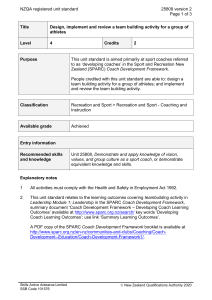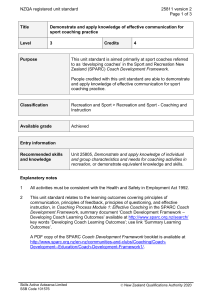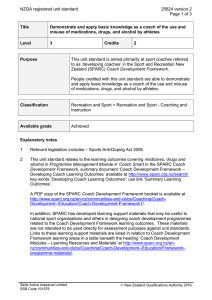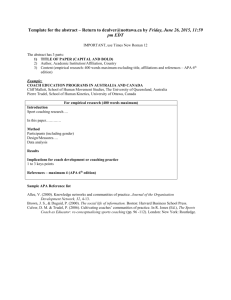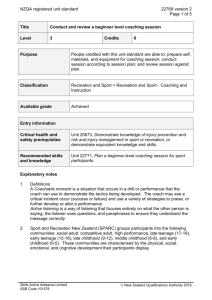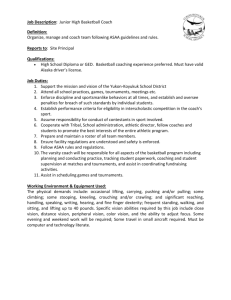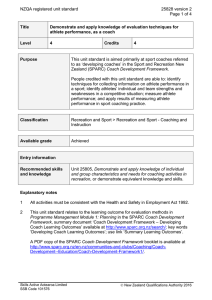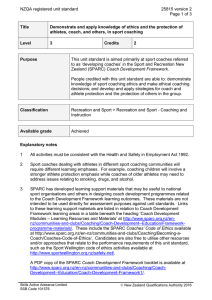Word - NZQA
advertisement
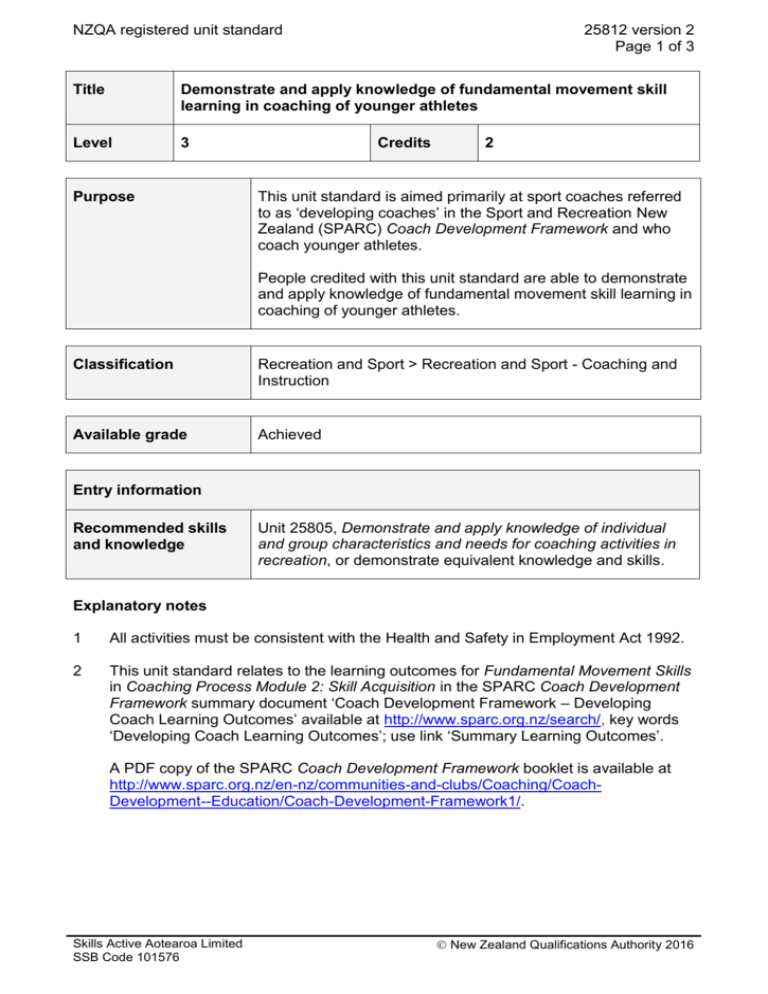
NZQA registered unit standard 25812 version 2 Page 1 of 3 Title Demonstrate and apply knowledge of fundamental movement skill learning in coaching of younger athletes Level 3 Purpose Credits 2 This unit standard is aimed primarily at sport coaches referred to as ‘developing coaches’ in the Sport and Recreation New Zealand (SPARC) Coach Development Framework and who coach younger athletes. People credited with this unit standard are able to demonstrate and apply knowledge of fundamental movement skill learning in coaching of younger athletes. Classification Recreation and Sport > Recreation and Sport - Coaching and Instruction Available grade Achieved Entry information Recommended skills and knowledge Unit 25805, Demonstrate and apply knowledge of individual and group characteristics and needs for coaching activities in recreation, or demonstrate equivalent knowledge and skills. Explanatory notes 1 All activities must be consistent with the Health and Safety in Employment Act 1992. 2 This unit standard relates to the learning outcomes for Fundamental Movement Skills in Coaching Process Module 2: Skill Acquisition in the SPARC Coach Development Framework summary document ‘Coach Development Framework – Developing Coach Learning Outcomes’ available at http://www.sparc.org.nz/search/, key words ‘Developing Coach Learning Outcomes’; use link ‘Summary Learning Outcomes’. A PDF copy of the SPARC Coach Development Framework booklet is available at http://www.sparc.org.nz/en-nz/communities-and-clubs/Coaching/CoachDevelopment--Education/Coach-Development-Framework1/. Skills Active Aotearoa Limited SSB Code 101576 New Zealand Qualifications Authority 2016 NZQA registered unit standard 25812 version 2 Page 2 of 3 In addition, SPARC has developed learning support materials that may be useful to national sport organisations and others in designing coach development programmes related to the Coach Development Framework learning outcomes. These materials are not intended to be used directly for assessment purposes against unit standards. Links to these learning support materials are listed in relation to Coach Development Framework learning outcome areas in a table beneath the heading ‘Coach Development Modules – Learning Resources and Materials’ at http://www.sparc.org.nz/en-nz/communities-and-clubs/Coaching/CoachDevelopment--Education/Framework-programme-materials/. 3 Definitions Sport coaching community refers to a coaching community (of athletes) primarily, but not exclusively, recognised in terms of age and/or stage by SPARC in the Coach Development Framework and/or by a national sport organisation. Younger athletes refers to athletes in the middle and/or late childhood sport coaching communities or equivalent in terms of stage of development. Outcomes and evidence requirements Outcome 1 Demonstrate and apply knowledge of fundamental movement skill learning in coaching of younger athletes. Evidence requirements 1.1 Description of fundamental movement skills for younger athletes identifies eight fundamental movement skills; identifies each skill as a locomotor, stability, or manipulative skill; and describes how the skill contributes to participation in a selected sport. 1.2 The concept of spatial awareness is discussed in relation to fundamental movement skills. 1.3 Sport related activities are designed for six fundamental movement skills to enable athlete skill development. Range at least two each of – locomotor skills, stability skills, manipulative skills; activity design may include but is not limited to specification of – the movement skill or concept involved, set-up, activity description, learning points, questions that might be asked, variations. 1.4 Two of the designed activities are incorporated into a sport coaching session, with any required modifications based on athlete needs. 1.5 Reflection on fundamental movement skill learning in coaching sessions identifies success of the activity in relation to developing the intended movement skill or concept, success of the activity, and any required improvements for future coaching practice. Skills Active Aotearoa Limited SSB Code 101576 New Zealand Qualifications Authority 2016 NZQA registered unit standard Planned review date 25812 version 2 Page 3 of 3 31 December 2012 Status information and last date for assessment for superseded versions Process Version Date Last Date for Assessment Registration 1 16 April 2010 31 December 2012 Rollover and Revision 2 20 May 2011 N/A Consent and Moderation Requirements (CMR) reference 0099 This CMR can be accessed at http://www.nzqa.govt.nz/framework/search/index.do. Please note Providers must be granted consent to assess against standards (accredited) by NZQA, before they can report credits from assessment against unit standards or deliver courses of study leading to that assessment. Industry Training Organisations must be granted consent to assess against standards by NZQA before they can register credits from assessment against unit standards. Providers and Industry Training Organisations, which have been granted consent and which are assessing against unit standards must engage with the moderation system that applies to those standards. Requirements for consent to assess and an outline of the moderation system that applies to this standard are outlined in the Consent and Moderation Requirements (CMRs). The CMR also includes useful information about special requirements for organisations wishing to develop education and training programmes, such as minimum qualifications for tutors and assessors, and special resource requirements. Comments on this unit standard Please contact Skills Active Aotearoa Limited info@skillsactive.org.nz if you wish to suggest changes to the content of this unit standard. Skills Active Aotearoa Limited SSB Code 101576 New Zealand Qualifications Authority 2016

